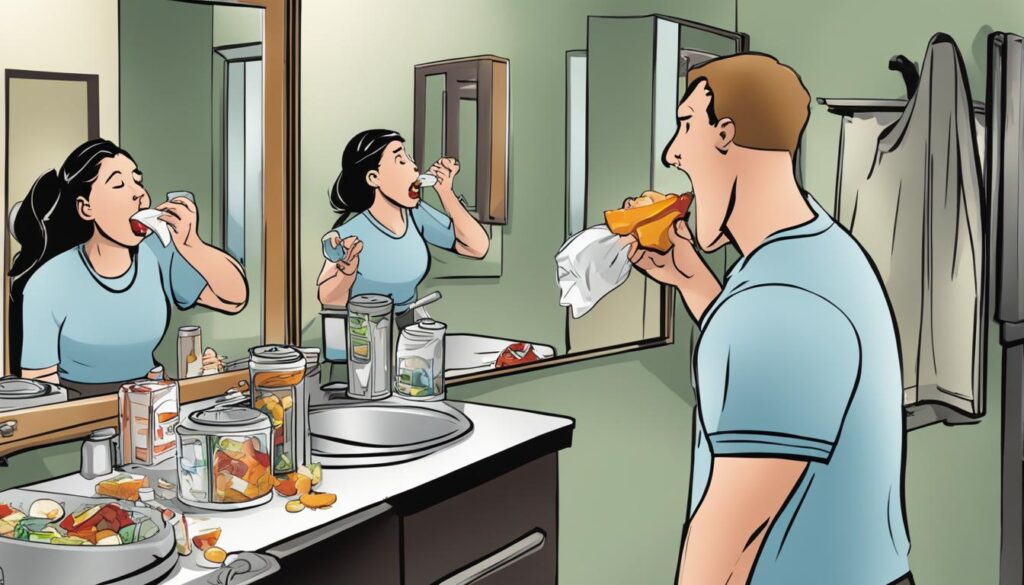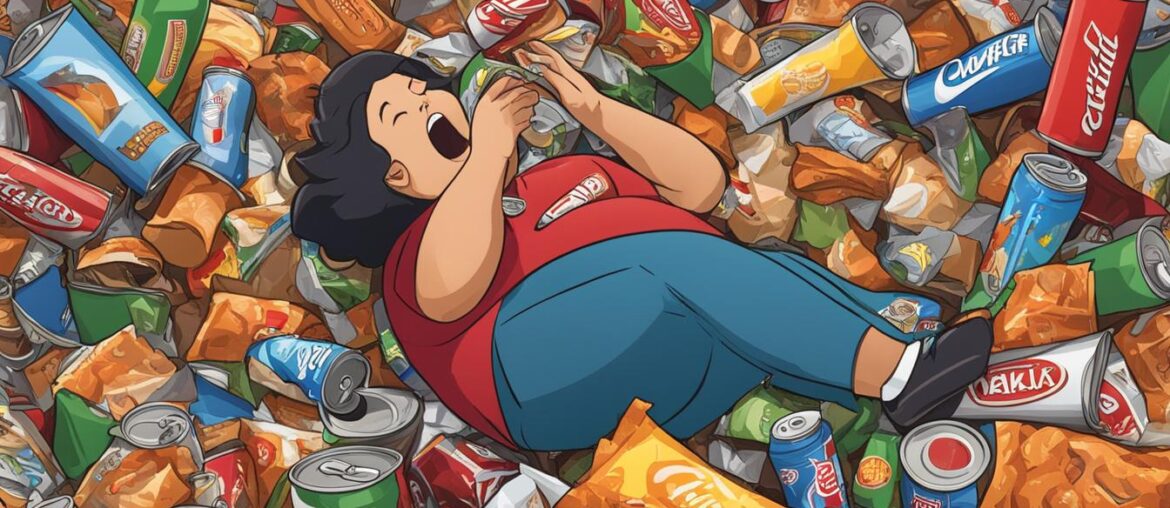There are various methods that people try in order to lose weight, but one question that often comes up is whether spitting can actually help in weight loss. In this article, I will explore the truth behind this popular belief by examining data and insights from various sources.
Key Takeaways:
- Spitting is not an effective method for weight loss.
- Healthy and sustainable weight management practices are essential for overall well-being.
- Chewing and spitting behavior can indicate deeper concerns and underlying mental health conditions.
- Seeking professional help and guidance is important for achieving weight management goals.
- Chewing and spitting can have serious consequences for both physical and mental health.
Scale-Tipping Tricks used by Wrestlers
Wrestlers often have to meet strict weight requirements for their matches, and they employ various tactics to achieve their desired weight. Some of these tactics include wearing plastic and rubber sweat suits, piling on layers of clothes to induce sweating, and even standing on their heads for a brief period of time.
Additionally, wrestlers avoid drinking too much water and opt for small morsels of food to manage their weight. While some wrestlers have mentioned spitting as a last-ditch effort to lose weight, it is important to note that these strategies are specific to the sport and may not be applicable or healthy for general weight loss purposes.
It’s crucial to understand that the weight management techniques employed by wrestlers are intended for temporary weight loss before a match and are closely monitored by coaches and medical professionals. These extreme measures should not be encouraged or attempted without proper guidance and supervision.
For wrestlers, these practices are part of their sport-specific training and are not to be confused with sustainable weight loss methods for the general population. In fact, attempting to replicate these practices can have adverse effects on overall health.
Chewing and Spitting Disorder Explained

Chewing and spitting behavior, or CHSP, refers to the act of chewing food and spitting it out without swallowing. This behavior is often associated with attempts to enjoy the flavor of food without consuming the calories. However, it is important to recognize that chewing and spitting can be indicative of deeper underlying issues.
CHSP is not simply a dieting tip, but rather a behavior that can be a symptom of various mental health conditions. Individuals who engage in chewing and spitting may be struggling with anxiety disorders, negative body image, or other related conditions. This act of spitting out food without swallowing can contribute to the development of disordered eating patterns.
It is crucial to understand that chewing and spitting is not a healthy or sustainable method of weight management. While some may view it as a way to enjoy the taste of food without consuming the calories, it can have serious consequences for both physical and mental health.
“Chewing and spitting behavior can be a red flag for disordered eating and should not be taken lightly.”
Seeking help from a healthcare professional is important for individuals struggling with chewing and spitting behaviors. These professionals can provide the necessary support and resources to address the underlying mental health conditions and disordered eating patterns associated with CHSP.
It is essential to prioritize overall well-being and adopt healthy and sustainable ways of managing weight. Consulting healthcare professionals can provide personalized advice and guidance to help individuals achieve their weight management goals without resorting to harmful behaviors.
Potential Mental Health Conditions Associated with Chewing and Spitting
| Mental Health Condition | Common Symptoms |
|---|---|
| Anxiety Disorders | Excessive worrying, restlessness, panic attacks |
| Negative Body Image | Obsessive thoughts about weight and appearance, distorted perception of body shape |
| Eating Disorders | Restrictive eating, binge eating, purging behaviors |
Prevalence and Concerns about CHSP
Chewing and spitting behavior, also known as CHSP, has gained popularity among certain individuals as a supposed dieting tip. However, it is important to recognize the potential harm it can cause to both physical and mental health. Studies have shown that CHSP can be associated with psychological distress, indicating deeper concerns at play.
While the exact numbers may vary, it is estimated that approximately 12% of teenagers have tried chewing and spitting behavior. The visibility and promotion of this behavior can contribute to its prevalence, perpetuating the notion that it is a viable weight management strategy.
However, it is crucial to understand that CHSP is not a healthy or sustainable method for weight loss. In fact, it can have serious consequences for both the mind and body. By focusing on the act of chewing and spitting without actually consuming the food, individuals deprive themselves of necessary nutrients and may experience negative effects on their physical well-being.
Furthermore, the psychological distress associated with CHSP should not be overlooked. Using chewing and spitting as a means of controlling one’s weight can lead to a distorted relationship with food and potentially trigger or worsen disordered eating patterns.
Chewing and spitting behavior may seem like a quick solution or a dieting tip, but it is essential to prioritize holistic approaches to weight management that promote overall well-being and long-term health.
| Concerns about CHSP | Impact |
|---|---|
| Potential nutrient deficiencies | Malnourishment and inadequate intake of essential vitamins and minerals |
| Psychological distress | Exacerbation of negative body image, anxiety, and disordered eating patterns |
| Physical consequences | Stomach issues (e.g., ulcers), dental problems (e.g., tooth decay), and hormonal imbalances |
It is crucial to address the prevalence of chewing and spitting behavior and the concerning impact it can have on individuals’ physical and mental well-being. By debunking the idea that CHSP is a valid dieting tip, we can promote healthier approaches to weight management and body positivity.
Is CHSP an Eating Disorder?
The classification of CHSP as an eating disorder is a subject of debate among experts. Some argue that it should be recognized as its own disorder, while others consider it a symptom of other eating disorders. While it is not currently listed in the Diagnostic and Statistical Manual of Mental Disorders (DSM), some believe that its inclusion could help identify and address the behaviors associated with CHSP.
Chewing and Spitting Disorder, commonly known as CHSP, refers to the act of chewing food and spitting it out without swallowing. It is often associated with attempts to enjoy the flavor of food without consuming the calories. While some may view this behavior solely as a dieting tip, it can also be a symptom of underlying mental health conditions, such as anxiety disorders and negative body image.
“Chewing and spitting behavior can be a manifestation of disordered eating patterns and is often seen in individuals with eating disorders.”
While CHSP shares similarities with eating disorders, it is important to note that it is not officially recognized as a standalone eating disorder in current diagnostic criteria.
Despite the ongoing debate, it is crucial to acknowledge and address the potential harmful effects of CHSP on both physical and mental health. Seeking professional help and support is essential for individuals struggling with this behavior.
| Eating Disorder | Symptoms |
|---|---|
| Anorexia Nervosa | Extreme fear of weight gain, restricted food intake, distorted body image |
| Bulimia Nervosa | Binge eating followed by compensatory behaviors such as vomiting, excessive exercise |
| Binge Eating Disorder | Recurrent episodes of excessive eating without compensatory behaviors |
| Chewing and Spitting Disorder (CHSP) | Chewing food and spitting it out without swallowing, not officially recognized as a standalone disorder |
Side Effects of Chewing and Spitting

Chewing and spitting can have various negative effects on the body. It can lead to malnourishment as the body is not able to absorb necessary nutrients when food is not swallowed. Additionally, it can cause stomach issues, such as ulcers, as well as dental problems like tooth decay and cavities. Hormonal imbalances may also arise as a result of this behavior. It is clear that chewing and spitting can have serious consequences for both the mind and body.
| Side Effects | Impact |
|---|---|
| Malnourishment | The body cannot absorb necessary nutrients |
| Stomach issues | Potential development of ulcers |
| Tooth decay and cavities | Dental problems resulting from not swallowing food |
| Hormonal imbalances | Disruption of hormonal regulation due to unhealthy eating patterns |
Treatment and Seeking Help for CHSP
If you or someone you know is struggling with chewing and spitting behaviors, it is important to seek help from a healthcare professional. CHSP is often indicative of deeper concerns and underlying mental health conditions. Therapy can be beneficial in addressing these behaviors and providing support for recovery. It is crucial to address not only the chewing and spitting behavior itself but also any other underlying issues that may contribute to its development.
Seeking Help
Don’t stay silent and face the challenges of chewing and spitting alone. Seeking help from a healthcare professional is the first step towards recovery. A specialized therapist or counselor can provide guidance and support tailored to your specific needs. They can help you explore the underlying causes of CHSP and develop strategies to overcome it.
Therapy for CHSP
Therapy plays a crucial role in the treatment of chewing and spitting behaviors. Cognitive-behavioral therapy (CBT) is one of the most effective approaches used to address the underlying psychological factors contributing to CHSP. A therapist will work with you to identify and challenge negative thoughts and behaviors associated with CHSP, helping you develop healthier coping mechanisms.
Therapy can provide a safe space for individuals struggling with CHSP to process their emotions, learn alternative ways to cope, and develop a positive relationship with food.
A Multidisciplinary Approach
While therapy is a fundamental part of treatment, a multidisciplinary approach may be necessary for comprehensive care. This may involve collaboration with a team of healthcare professionals, such as dietitians, physicians, and psychiatrists, to address the physical, nutritional, and mental health aspects of CHSP.
Recovery and Beyond
Recovery from chewing and spitting behaviors is possible with the right support and treatment. It may take time and patience, but focusing on a holistic approach to recovery can facilitate lasting change. Therapy can help you build a healthier relationship with food, develop self-care practices, and cultivate a positive body image.
| Benefits of Seeking Help and Therapy for CHSP | What therapy can offer |
|---|---|
| 1. Professional guidance in understanding and addressing the underlying causes of CHSP. | 1. A safe space to explore emotions and develop healthy coping mechanisms. |
| 2. Tailored treatment plans that address the specific needs of each individual. | 2. Techniques to challenge negative thoughts and behaviors associated with CHSP. |
| 3. Support in developing a positive relationship with food and promoting a healthy body image. | 3. Collaboration with a multidisciplinary team for comprehensive care. |
| 4. A path towards long-term recovery and improved overall well-being. | 4. Tools for managing stress, anxiety, and disordered eating patterns. |
FAQs about Chewing and Spitting

As chewing and spitting behavior continues to raise questions, let’s address some of the most commonly asked concerns regarding this practice.
Can chewing and spitting lead to insulin resistance?
There is no direct link between chewing and spitting behavior and insulin resistance. Insulin resistance typically develops due to a combination of factors, including genetics, diet, and lifestyle habits. However, engaging in disordered eating patterns, such as chewing and spitting, can contribute to an unhealthy relationship with food and potentially lead to negative impacts on overall health.
Does chewing and spitting result in weight loss?
While some individuals may believe that chewing and spitting can aid in weight loss, it is not a sustainable or healthy method for managing weight. Chewing and spitting does not guarantee weight loss, as the body may still absorb some calories from the food despite not swallowing it. Additionally, this behavior can have detrimental effects on mental and physical well-being.
Can chewing and spitting cause weight gain?
Chewing and spitting behavior alone is unlikely to cause weight gain. However, it can contribute to an unhealthy mindset and disordered eating patterns, which may indirectly lead to weight gain or difficulty in maintaining a balanced weight. It is important to address the underlying causes of chewing and spitting and adopt healthier approaches to food and weight management.
What are the effects of chewing and spitting on calorie absorption?
When chewing and spitting food, some calories may still be absorbed by the body, especially in the form of saliva and small particles that may be swallowed unintentionally. However, the act of spitting out food without swallowing significantly reduces the absorption of nutrients and calories. This can potentially lead to nutritional deficiencies and imbalances.
Is there a connection between chewing and spitting and eating disorders?
Chewing and spitting behavior is often associated with disordered eating patterns and can be a symptom or precursor to eating disorders. While it is not classified as a specific eating disorder in the Diagnostic and Statistical Manual of Mental Disorders (DSM), it is recognized as a problematic behavior that warrants professional attention and intervention.
Overall, chewing and spitting is not a healthy or sustainable method for weight management. It can have detrimental effects on both physical and mental health. If you or someone you know is struggling with chewing and spitting behavior or disordered eating patterns, it is important to seek professional help and support for proper diagnosis and treatment.
The Link Between CHSP and Eating Disorders
Studies have shown that chewing and spitting behaviors are prevalent among individuals with eating disorders. It is often used as a compensatory behavior in response to disordered eating patterns.
While there is currently no specific drug treatment for CHSP, it is crucial to recognize it as a potential indicator of illness severity in eating disorders.
Early intervention and proper treatment can help prevent the worsening of these conditions.
The Potential Role of Selective Serotonin Reuptake Inhibitors (SSRIs)

While there is no specific drug treatment for chewing and spitting behavior (CHSP), some studies have explored the use of selective serotonin reuptake inhibitors (SSRIs) in addressing this behavior. SSRIs are a type of medication commonly used to treat conditions such as depression, anxiety disorders, and eating disorders. Although more research is needed, there is some evidence to suggest that SSRIs may be effective in reducing CHSP.
In one case study, an individual with anorexia nervosa who exhibited chewing and spitting behavior experienced a reduction in these behaviors after being prescribed SSRIs. This suggests that medication may play a role in the treatment of chewing and spitting behaviors, particularly in the context of eating disorders.
However, it is important to note that SSRIs should not be considered a standalone treatment for CHSP. They should be used in conjunction with other therapeutic interventions, such as cognitive-behavioral therapy (CBT), to address the underlying psychological factors contributing to the behavior.
It is essential to consult with a healthcare professional, such as a psychiatrist or psychologist, to determine the appropriate treatment plan for individuals struggling with chewing and spitting behaviors. The use of SSRIs should always be prescribed and monitored by a qualified medical practitioner.
Key takeaways:
- SSRIs have been studied as a potential treatment for chewing and spitting behavior.
- There is limited evidence suggesting that SSRIs may help reduce these behaviors, particularly in individuals with eating disorders.
- SSRIs should be used as part of a comprehensive treatment plan that includes therapy and addresses the underlying psychological factors contributing to CHSP.
- Consultation with a healthcare professional is crucial to determine the appropriate treatment approach for individuals with chewing and spitting behaviors.
Conclusion
In conclusion, it is important to debunk the myth that spitting can aid in weight loss. There is no factual evidence to support this belief. On the contrary, chewing and spitting behavior, whether utilized as a weight management strategy or as a symptom of disordered eating, can have severe repercussions for both physical and mental well-being.
For individuals seeking effective weight management, it is crucial to consult healthcare professionals who can provide personalized advice and guidance. They can help develop healthy and sustainable practices that lead to long-term success without compromising overall health.
Adopting a holistic approach to weight management is essential. This involves seeking professional help to address any underlying mental health conditions or disordered eating patterns associated with chewing and spitting. By addressing these deeper concerns, individuals can achieve their weight management goals while prioritizing their overall well-being.
Remember, factual data contradicts the notion that spitting aids in weight loss. Instead, focusing on a combination of balanced nutrition, regular physical activity, and professional guidance is key to achieving and maintaining a healthy weight.
FAQ
Does spitting help with weight loss?
No, spitting does not help with weight loss. It is not a healthy or sustainable method for weight management.
What are some weight loss methods used by wrestlers?
Wrestlers employ various tactics such as wearing sweat suits, piling on layers of clothes, and restricting water intake and food consumption.
What is chewing and spitting behavior (CHSP)?
CHSP refers to the act of chewing food and spitting it out without swallowing. It is often associated with disordered eating patterns and mental health conditions.
Is chewing and spitting a popular dieting tip?
Chewing and spitting is sometimes advertised as a dieting tip, but it can lead to psychological distress and negatively impact overall health.
Is chewing and spitting considered an eating disorder?
The classification of chewing and spitting as an eating disorder is a subject of debate among experts, but it is often associated with eating disorders.
What are the side effects of chewing and spitting?
Chewing and spitting can lead to malnourishment, stomach issues, dental problems, and hormonal imbalances.
How can I seek help for chewing and spitting behaviors?
It is important to seek help from a healthcare professional who can provide therapy and support for addressing chewing and spitting behaviors.
What are some frequently asked questions about chewing and spitting?
Common questions include the effects on insulin resistance, weight loss or weight gain, calorie absorption, and its connection to eating disorders.
Is there a link between chewing and spitting and eating disorders?
Chewing and spitting behaviors are prevalent among individuals with eating disorders and can be used as compensatory behaviors.
Are there any specific drug treatments for chewing and spitting?
There is currently no specific drug treatment for chewing and spitting, but medication, such as selective serotonin reuptake inhibitors (SSRIs), may be explored as a potential treatment option.
What is the conclusion regarding spitting and weight loss?
Spitting is not an effective or healthy method for weight management. Adopting healthy and sustainable weight management practices and seeking professional help are crucial for overall well-being.




